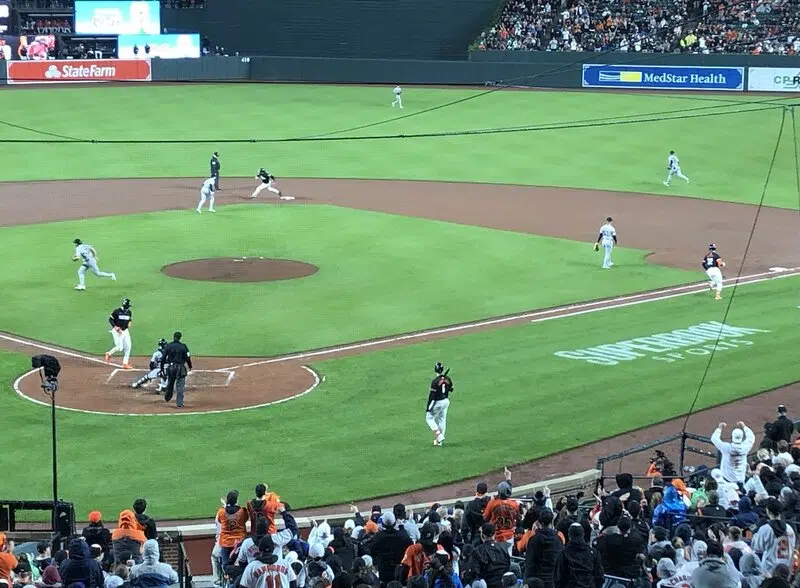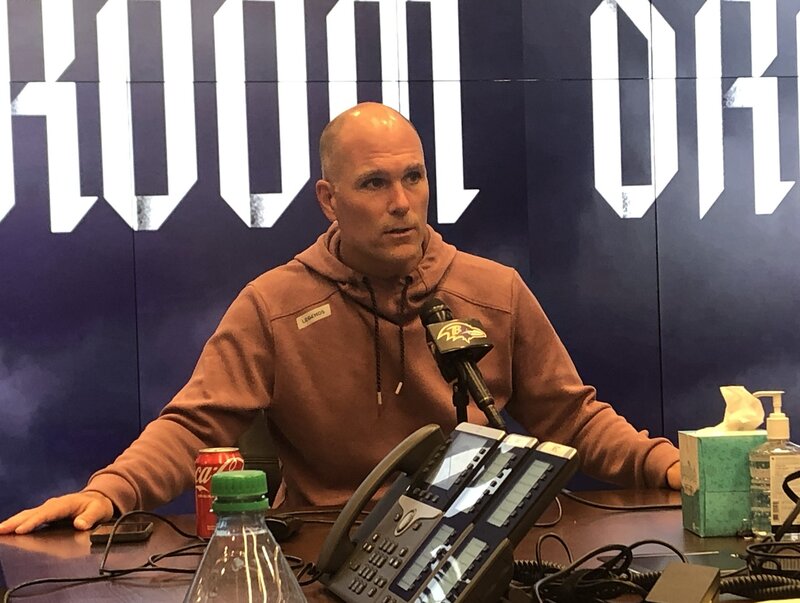In reality, Lewis probably has far more detractors than supporters in NFL fan circles. When you consider his reputation outside of Baltimore and the ensuing fallout created from Atlanta, long before most people knew he great he was on the football field, Ray is hardly a beloved figure around the league. When Ray Lewis was arrested in Atlanta in early 2000 on the double murder charge and his trial played out on national television during that summer, the Ravens had still never played on Monday Night Football, let alone a playoff game. The first time many people in the mainstream ever saw an image of Ray Lewis was in an orange jumpsuit. Imagine that being your welcoming moment to the American sports lexicon — handcuffs and the lead story as a murder suspect on ESPN.
The facts about the most infamous night of Ray Lewis’ life in Atlanta have been part of the media, the public courtroom, and fans’ lore since January 30, 2000. There are enough twisted reports on the internet and opinion pieces to fill a book about the murders of Jacinth “Shorty” Baker and Richard Lollar and Lewis’ limousine companions Reginald Oakley and Joseph Sweeting at Cobalt Lounge in the alcohol-soaked neighborhood of Buckhead in suburban Atlanta. Ray Lewis pleaded guilty to an obstruction of justice charge. In the summer of 2000, Lewis was fined $250,000 by the NFL for “conduct detrimental to the league.” At one point in 2004, it was reported that Lewis paid the families of Lollar and Baker more than $1 million to settle a civil trial on behalf of Lollar’s 4-year old daughter. Lewis never commented on it.
The murders in Atlanta have followed Lewis on every road trip, every Sunday where abusive fans have openly called him a murderer from the stands. His teammates have all heard it on the sidelines over the past 12 years. When the Ravens won the AFC Championship Game in New England, it was clear the ghosts of Atlanta and the questions would surface again in New Orleans, and they did.
“Nobody here is really qualified to ask those questions,” said Lewis deflecting the first question about the murders or the topic of Atlanta 2000 at the Super Bowl Media Day session. “I just truly feel that this is God’s time, and whatever His time is, you know, let it be his will. Don’t try to please everybody with your words, try to make everybody’s story [sounds] right. At this time, I would rather direct my questions in other places because I live with that every day. You, maybe, can take a break from it. I don’t. I live with it every day of my life and I would rather not talk about it today.”
Every witness to the scene in Atlanta said that Ray Lewis was acting as a peacekeeper in trying to break up the melee. His limo was the one being shot at by the ones who started the altercation and followed his group down the street forcing the tension. Yet, his decisions immediately following the fracas — the cover up, the disappearance of his clothes, the fallout of the judicial system, and his 15 days spent behind bars in a Georgia prison — led him back to God, but not without a great deal of anger.
In December 2000, less than two months before he’d win Super Bowl XXXV and just five months removed from the Atlanta trial, he voiced his complex emotions via his relationship with then-Miami Herald sportswriter Dan LeBatard, who essentially ghost wrote a piece with Ray Lewis in his voice for ESPN Magazine.
Here are some of his thoughts at that time:
I wept when my 5-year-old son asked me why Daddy was always on TV wearing chains. I wept myself to sleep some nights on that nasty bed in that nasty cell. Those 15 days in jail after the Super Bowl were the worst, longest days of my life. I was bored, lonely, suffering, sad, frustrated, bitter, helpless … and angry as all hell. It has been almost a year, and I’m still angry. At the politicians, because they played with my life, using my name just to make themselves more famous. And at the NFL, for hitting me with one of the biggest fines in sports history for a misdemeanor while the league’s drug users, drunken drivers and wife beaters never get hit half as hard. I’d like to know when I get to stop paying for a crime I didn’t commit.
Me? Killing somebody? Man, please. I ain’t even been in a fight since high school, but it seemed like every other time the TV came on in jail, it showed me in that damn orange jumpsuit and chains. That replaced my football uniform. That’s the only way some people on the outside know me.
I’d worked all my life to be a famous football player. Now I was, for all the wrong reasons. I’m bitter about certain things, but I won’t hate anybody for what happened to me, because you don’t get into heaven hating. Jesus was spit on and lashed at and He hung his head and never said a mumbling word, so what do I have to say about people who still think that I murdered two people?
I prayed about what was happening to me the first night in jail, but I let it go after that. I didn’t keep praying, asking God every five minutes if He had taken care of it. I put all my problems in my hand, threw them in the air, and let Him handle the rest. We can moan, cry and get upset because we’re human, but He has control. He says that “to whom much is given, much is required” and “when you go through tragedy, I’ll make it your biggest treasure.
This mess has cost me my good name, cost me months of my life in jail and on trial, cost me faith in the judicial system and in the media and in “innocent until proven guilty.” It has cost me more than $2 million. And it has cost me two groups of fans—the group that hated me for being in that courtroom to begin with, and the keepin’-it-real folks who thought I shouldn’t have testified against my friends. It was an expensive lesson all around.”
He told LeBatard that he wasn’t the same player that he was before the incarceration. He said he was better. Twelve years later, he has this perspective:
“I don’t know anybody, honestly, who has lived a perfect life,” Lewis said in 2013. “But, I have seen people who went through things before, and realistically, most of the time what happened when you find somebody goes through adversity, you really find out what their true character is. I think for me, people really now have taken time to find out who I am. They are really learning what my character is. My character is simply just to make this world a better place, to encourage people that, no matter what you are going through, it really isn’t about what you are going through; it’s your mindset while you are going through it. So, when you see all of the support that I am getting right now, I am in total awe of the respect people have for someone who has been through adversity, but found his way out and just really showing what my true character is and who I am as a person.”
On the field, he set the standard for how hard one could push, and how fast a middle linebacker could get to a ball carrier. “When I see guys not running to the ball, not giving effort, I can’t stand for that,” Lewis once said. And sometimes his hardest hits and aggressive play have gotten him fined. He was a very outspoken critic of new rules in the 21st century that took instinct out of the defensive part of the game. He was never known as a headhunter but certainly was flagged for hard hits and wound up having a lighter paycheck several times due to the NFL’s growing awareness of head trauma, injuries, and the reputation of the league’s commitment to player safety. “Don’t take away from the game,” he said, calling for instant replay and better officiating. “Football is about getting hit.”




























